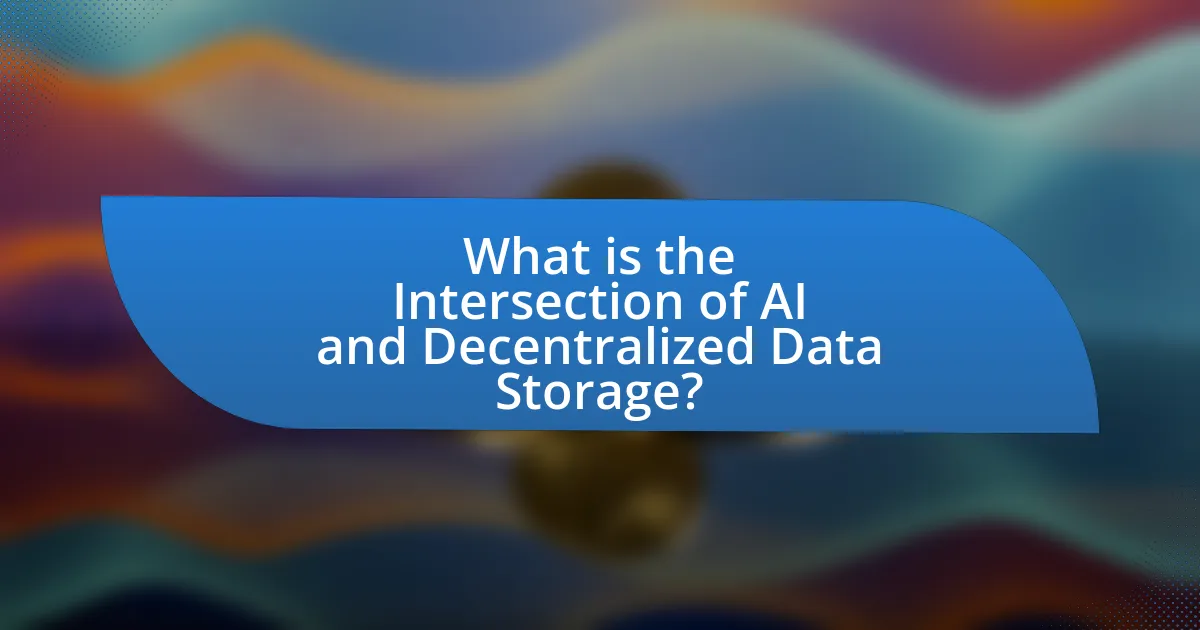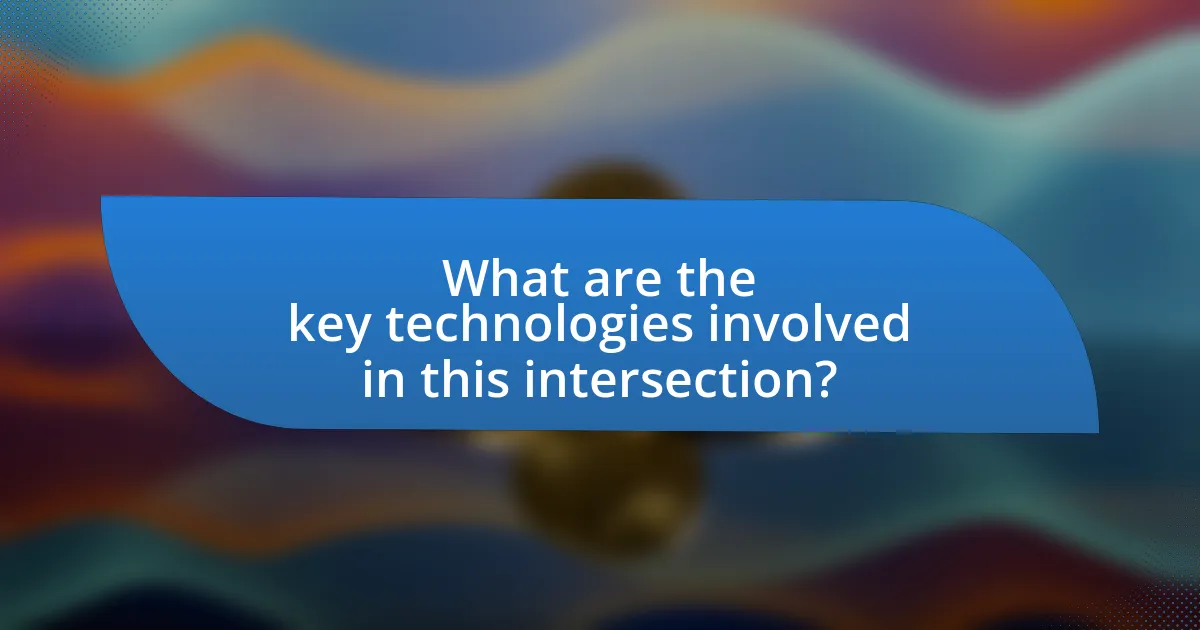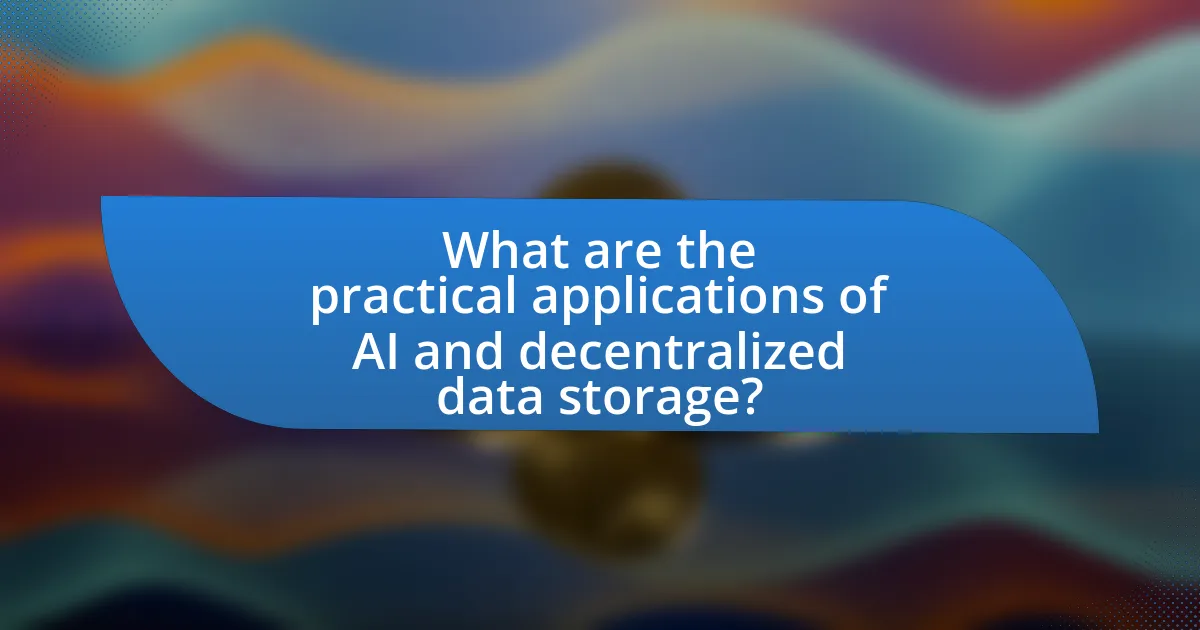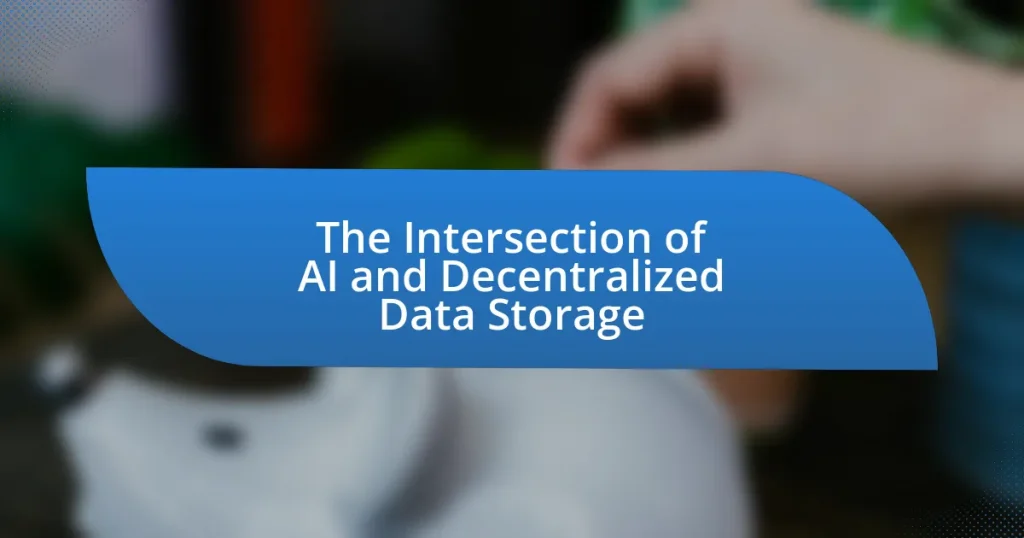The intersection of artificial intelligence (AI) and decentralized data storage focuses on integrating AI algorithms with distributed storage systems to improve data accessibility, security, and processing efficiency. This article explores how AI enhances data management through automation, predictive analytics, and decision support while leveraging decentralized storage solutions like blockchain and IPFS to ensure data integrity and privacy. It discusses the fundamental principles of AI in data management, the role of machine learning in optimizing data retrieval, and the practical applications across various industries, including healthcare and finance. Additionally, the article addresses the challenges faced by traditional data storage methods and outlines best practices for organizations to implement AI and decentralized storage effectively.

What is the Intersection of AI and Decentralized Data Storage?
The intersection of AI and decentralized data storage involves the integration of artificial intelligence algorithms with distributed storage systems to enhance data accessibility, security, and processing efficiency. AI can analyze and manage data stored across decentralized networks, improving decision-making and predictive analytics while ensuring that data remains secure and tamper-proof due to the inherent characteristics of decentralized storage. For instance, blockchain technology, a form of decentralized storage, provides a transparent and immutable ledger that AI can leverage for training models on trustworthy datasets, thereby increasing the reliability of AI outputs.
How do AI and decentralized data storage interact?
AI and decentralized data storage interact by enabling efficient data processing and management while enhancing security and privacy. AI algorithms can analyze and derive insights from data stored in decentralized systems, such as blockchain, which ensures that data is tamper-proof and accessible only to authorized users. For instance, decentralized storage solutions like IPFS (InterPlanetary File System) allow AI models to access large datasets without relying on a central authority, thus reducing the risk of data breaches. Additionally, the integration of AI with decentralized storage can optimize data retrieval processes, making it faster and more reliable, as seen in projects that utilize machine learning to improve data indexing in distributed networks.
What are the fundamental principles of AI in data management?
The fundamental principles of AI in data management include automation, data quality enhancement, predictive analytics, and decision support. Automation allows AI systems to streamline data processing tasks, reducing manual effort and increasing efficiency. Data quality enhancement involves using AI algorithms to identify and rectify errors or inconsistencies in datasets, ensuring reliable information for analysis. Predictive analytics leverages historical data to forecast future trends, enabling organizations to make informed decisions. Decision support systems utilize AI to analyze complex data sets, providing actionable insights that aid in strategic planning. These principles are validated by numerous studies, such as the 2021 report by McKinsey & Company, which highlights the significant impact of AI on improving data management practices across various industries.
How does decentralized data storage enhance AI capabilities?
Decentralized data storage enhances AI capabilities by providing increased data availability, security, and diversity. This architecture allows AI systems to access a broader range of data from multiple sources, which improves model training and accuracy. For instance, decentralized storage systems like IPFS (InterPlanetary File System) enable efficient data retrieval and sharing across networks, reducing latency and enhancing real-time processing. Additionally, the distributed nature of decentralized storage mitigates risks of data breaches and single points of failure, ensuring that AI models can operate on reliable and secure datasets. This combination of accessibility and security ultimately leads to more robust AI applications capable of learning from diverse and comprehensive datasets.
Why is the intersection of AI and decentralized data storage important?
The intersection of AI and decentralized data storage is important because it enhances data security, privacy, and accessibility while enabling more efficient data processing. Decentralized data storage systems, such as blockchain, provide a secure environment where data is distributed across multiple nodes, reducing the risk of data breaches and unauthorized access. AI algorithms can analyze this data in real-time, leading to improved decision-making and insights. For instance, a study by the Massachusetts Institute of Technology found that decentralized storage can reduce data retrieval times by up to 50%, allowing AI systems to operate more effectively. This synergy not only fosters innovation but also ensures that users maintain control over their data, aligning with growing concerns about data sovereignty and privacy.
What challenges do traditional data storage methods face?
Traditional data storage methods face significant challenges, including scalability, security vulnerabilities, and high costs. Scalability issues arise as data volumes grow exponentially; traditional systems often struggle to accommodate this increase efficiently. Security vulnerabilities are prevalent, as centralized storage solutions are prime targets for cyberattacks, leading to data breaches. Additionally, high costs associated with maintaining and upgrading hardware can hinder organizations from keeping pace with technological advancements. According to a report by IDC, the global data sphere is expected to reach 175 zettabytes by 2025, highlighting the urgent need for more adaptable storage solutions.
How can AI improve data security in decentralized systems?
AI can improve data security in decentralized systems by enhancing threat detection and response capabilities through machine learning algorithms. These algorithms analyze vast amounts of data in real-time to identify anomalies and potential security breaches, which traditional methods may overlook. For instance, a study by IBM found that AI-driven security systems can reduce the time to detect a breach from 200 days to just 18 days, significantly minimizing potential damage. Additionally, AI can automate security protocols, ensuring consistent enforcement of security policies across decentralized networks, thereby reducing human error and increasing overall system resilience.

What are the key technologies involved in this intersection?
The key technologies involved in the intersection of AI and decentralized data storage include blockchain, machine learning algorithms, and distributed ledger technology. Blockchain provides a secure and transparent framework for storing data across a decentralized network, ensuring data integrity and accessibility. Machine learning algorithms enable the analysis and processing of large datasets stored in decentralized systems, facilitating insights and decision-making. Distributed ledger technology enhances the efficiency of data transactions and storage, allowing for real-time updates and consensus across multiple nodes. These technologies collectively empower the integration of AI capabilities with decentralized data storage solutions, enhancing security, scalability, and performance.
What role does blockchain play in decentralized data storage?
Blockchain serves as a foundational technology for decentralized data storage by providing a secure, immutable ledger that enables data to be stored across a distributed network. This decentralization enhances data integrity and availability, as no single entity controls the data, reducing the risk of data breaches and manipulation. For instance, blockchain’s cryptographic techniques ensure that once data is recorded, it cannot be altered without consensus from the network participants, thereby maintaining a reliable history of transactions. Additionally, the use of smart contracts on blockchain platforms can automate data management processes, further streamlining operations in decentralized storage systems.
How does blockchain ensure data integrity and security?
Blockchain ensures data integrity and security through its decentralized and immutable ledger system. Each transaction is recorded in a block, which is linked to the previous block using cryptographic hashes, creating a chain that is resistant to tampering. This structure means that altering any single block would require changing all subsequent blocks, which is computationally infeasible due to the consensus mechanisms employed, such as Proof of Work or Proof of Stake. Additionally, the use of public and private keys ensures that only authorized users can access or modify the data, further enhancing security. The transparency of blockchain allows all participants to verify transactions independently, reinforcing trust and accountability within the network.
What are the limitations of blockchain in data storage?
Blockchain has several limitations in data storage, including scalability issues, high storage costs, and data immutability. Scalability is a significant concern, as blockchain networks can struggle to handle large volumes of transactions efficiently; for instance, Bitcoin processes approximately seven transactions per second, which is insufficient for high-demand applications. High storage costs arise because each node in a blockchain must maintain a complete copy of the entire ledger, leading to increased resource requirements. Additionally, data immutability, while a strength for security, poses challenges for correcting errors or updating information, as once data is recorded, it cannot be altered without consensus from the network, complicating data management.
How does machine learning contribute to decentralized data storage?
Machine learning enhances decentralized data storage by optimizing data management and retrieval processes. It enables efficient data classification, anomaly detection, and predictive analytics, which improve the overall performance of decentralized systems. For instance, machine learning algorithms can analyze patterns in data usage, allowing for dynamic resource allocation and reducing latency in data access. Additionally, techniques such as federated learning allow models to be trained across decentralized networks without compromising data privacy, thus maintaining the integrity of sensitive information. This integration of machine learning into decentralized storage systems leads to improved scalability and reliability, as evidenced by projects like Filecoin and Storj, which leverage these technologies to enhance user experience and data security.
What algorithms are commonly used in decentralized AI applications?
Common algorithms used in decentralized AI applications include Federated Learning, Blockchain-based consensus algorithms, and Differential Privacy techniques. Federated Learning enables multiple devices to collaboratively train a model while keeping data localized, thus enhancing privacy and reducing data transfer costs. Blockchain-based consensus algorithms, such as Proof of Work and Proof of Stake, ensure data integrity and trust among decentralized nodes. Differential Privacy techniques add noise to datasets, allowing for the extraction of insights without compromising individual data points. These algorithms collectively facilitate secure, efficient, and privacy-preserving AI applications in decentralized environments.
How can machine learning optimize data retrieval in decentralized systems?
Machine learning can optimize data retrieval in decentralized systems by enhancing search algorithms and improving data indexing. By utilizing techniques such as natural language processing and clustering, machine learning models can analyze user queries and data patterns to deliver more relevant results. For instance, a study by Google Research demonstrated that machine learning algorithms could reduce search time by up to 30% in decentralized databases by predicting user intent and streamlining data access pathways. This optimization leads to faster and more efficient retrieval processes, ultimately improving user experience in decentralized environments.

What are the practical applications of AI and decentralized data storage?
AI and decentralized data storage have practical applications in enhancing data security, improving data accessibility, and enabling efficient data processing. For instance, AI algorithms can analyze data stored on decentralized networks to identify patterns and anomalies, which enhances security by detecting potential breaches in real-time. Additionally, decentralized storage solutions, such as blockchain, allow for secure and transparent data sharing across multiple parties without a central authority, facilitating collaboration in sectors like healthcare and finance. Furthermore, AI can optimize data retrieval processes from decentralized systems, making it faster and more efficient, which is crucial for applications in real-time analytics and decision-making. These applications demonstrate the synergy between AI and decentralized data storage, leading to more secure, efficient, and accessible data management solutions.
In which industries is this intersection most impactful?
The intersection of AI and decentralized data storage is most impactful in the healthcare, finance, and supply chain industries. In healthcare, AI can analyze decentralized patient data for improved diagnostics and personalized treatment, enhancing patient outcomes. In finance, decentralized storage allows for secure, transparent transactions while AI algorithms can detect fraud and optimize trading strategies. In supply chain management, AI leverages decentralized data to enhance logistics, predict demand, and improve inventory management, leading to increased efficiency and reduced costs. These industries benefit significantly from the combination of AI’s analytical capabilities and the security and transparency provided by decentralized data storage.
How is healthcare utilizing AI and decentralized data storage?
Healthcare is utilizing AI and decentralized data storage to enhance patient care, streamline operations, and improve data security. AI algorithms analyze vast amounts of patient data stored in decentralized systems, enabling personalized treatment plans and predictive analytics for disease outbreaks. For instance, a study published in the Journal of Medical Internet Research demonstrated that AI can predict patient deterioration by analyzing real-time data from decentralized health records, leading to timely interventions. Additionally, decentralized data storage ensures that patient information is securely distributed across multiple nodes, reducing the risk of data breaches and enhancing patient privacy. This combination of AI and decentralized storage not only optimizes healthcare delivery but also fosters trust among patients regarding their data security.
What are the implications for finance and banking?
The implications for finance and banking at the intersection of AI and decentralized data storage include enhanced security, improved efficiency, and increased transparency. AI can analyze vast amounts of decentralized data to detect fraud and assess credit risk more accurately, thereby reducing losses for financial institutions. For instance, a study by McKinsey & Company highlights that AI-driven analytics can improve risk management by up to 30%. Additionally, decentralized data storage can streamline operations by enabling real-time access to information, which can reduce transaction times and costs. The integration of these technologies fosters a more transparent financial ecosystem, as blockchain-based systems provide immutable records of transactions, enhancing trust among stakeholders.
What are the potential future developments in this field?
Potential future developments in the intersection of AI and decentralized data storage include enhanced data privacy, improved data accessibility, and more efficient data processing. As AI algorithms evolve, they will increasingly leverage decentralized storage solutions to ensure that user data remains secure and private, reducing the risk of centralized data breaches. Furthermore, advancements in blockchain technology will facilitate seamless data sharing across decentralized networks, allowing AI systems to access diverse datasets for training and analysis without compromising user confidentiality. Research indicates that decentralized storage can lead to faster data retrieval times, which will enhance AI performance in real-time applications. Additionally, the integration of AI with decentralized storage may enable automated data management and optimization, streamlining workflows and reducing operational costs.
How might advancements in AI change decentralized data storage?
Advancements in AI may significantly enhance decentralized data storage by improving data management, security, and retrieval efficiency. AI algorithms can optimize data distribution across decentralized networks, ensuring that data is stored in the most efficient locations based on usage patterns and access frequency. For instance, machine learning techniques can predict data access needs, allowing for proactive data replication and reducing latency. Additionally, AI can bolster security through advanced anomaly detection, identifying potential breaches or unauthorized access in real-time, which is crucial for maintaining the integrity of decentralized systems. Research indicates that AI-driven solutions can reduce data retrieval times by up to 30%, demonstrating their potential impact on decentralized data storage efficiency.
What trends should we watch for in the coming years?
In the coming years, significant trends to watch include the integration of artificial intelligence with decentralized data storage solutions. This integration is expected to enhance data security, improve data accessibility, and facilitate real-time analytics. For instance, as blockchain technology matures, AI algorithms will increasingly leverage decentralized networks to ensure data integrity and privacy, which is crucial given the rising concerns over data breaches. Additionally, the growth of edge computing will enable AI applications to process data closer to its source, reducing latency and bandwidth usage while utilizing decentralized storage for efficiency. These trends are supported by the increasing investment in decentralized technologies, projected to reach $23.3 billion by 2023, indicating a robust shift towards these innovative solutions.
What best practices should organizations follow when implementing AI and decentralized data storage?
Organizations should prioritize data governance and security when implementing AI and decentralized data storage. Establishing clear data management policies ensures compliance with regulations such as GDPR, which mandates strict data handling practices. Additionally, organizations should invest in robust encryption methods to protect sensitive information stored in decentralized systems, as studies show that data breaches can lead to significant financial losses, averaging $3.86 million per incident according to IBM’s Cost of a Data Breach Report 2020. Furthermore, organizations must focus on interoperability between AI systems and decentralized storage solutions to facilitate seamless data access and processing, enhancing operational efficiency. Regular audits and assessments of AI algorithms are also essential to mitigate biases and ensure ethical AI usage, as highlighted by the AI Ethics Guidelines set forth by the European Commission.
How can organizations ensure data privacy and compliance?
Organizations can ensure data privacy and compliance by implementing robust data governance frameworks that include encryption, access controls, and regular audits. These measures protect sensitive information from unauthorized access and ensure adherence to regulations such as GDPR and HIPAA. For instance, a study by the International Association of Privacy Professionals (IAPP) found that organizations with comprehensive data governance policies are 50% more likely to achieve compliance with data protection laws. Additionally, training employees on data privacy practices and utilizing decentralized data storage solutions can further enhance security and compliance efforts.
What strategies can enhance the efficiency of AI in decentralized environments?
Implementing federated learning is a key strategy to enhance the efficiency of AI in decentralized environments. This approach allows AI models to be trained across multiple decentralized devices while keeping data localized, thus preserving privacy and reducing the need for data transfer. Research indicates that federated learning can significantly improve model performance by leveraging diverse data sources without compromising data integrity, as demonstrated in studies like “Federated Learning: Challenges, Methods, and Future Directions” by Kairouz et al. (2021), which highlights its effectiveness in various applications. Additionally, optimizing communication protocols and employing edge computing can further streamline AI processes by minimizing latency and bandwidth usage, ensuring that AI systems operate efficiently in decentralized settings.


